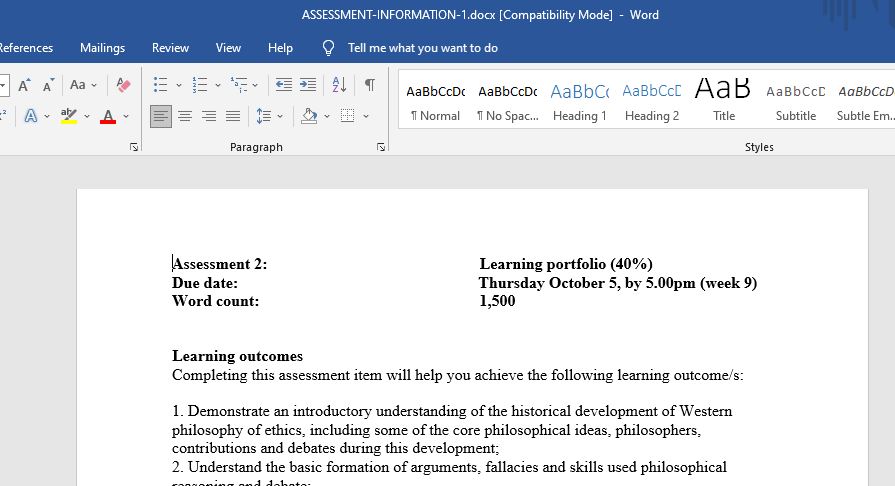Philosophy, Knowledge and Ethics: Assignment Two
Learning outcomes
Completing this assessment item will help you achieve the following learning outcome/s:
Demonstrate an introductory understanding of the historical development of Western philosophy of ethics, including some of the core philosophical ideas, philosophers, contributions and debates during this development;
- Understand the basic formation of arguments, fallacies and skills used philosophical reasoning and debate;
- Describe a range of philosophical views as they pertain to moral philosophy; and,
- Identify and articulate an understanding of the diversity in philosophical and ethical thought, and how this translates into competing views on a range of contemporary social issues.
Graduate Attributes
Completing this assessment item will help you achieve the following ECU Graduate Attributes:
- Critical appraisal skills
- Cross-cultural and international outlook
Preparation for this assignment
To prepare for this assignment you will need to access and review the learning materials and complete required readings and activities for the topics of ‘critical thinking’, ‘utilitarianism’, ‘deontology’, ‘social justice’ and ‘virtue ethics’.
Instructions
On Blackboard in Unit Information there is an Assignment 2 template (MS Word document) with 5 (five) questions1 pertaining to the topics of ‘critical thinking’, ‘utilitarianism’, ‘deontology’, ‘social justice’ and ‘virtue ethics’.
Answer and complete a response to ALL 5 (five) questions.
- Use the Assignment 2 template on Blackboard to complete your assignment.
- Use relevant literature to support and inform your answers.
You may write in first person and include your opinion where relevant and asked for, but ensure that you support your opinion with reference and explanation of relevant literature, including theories and concepts that relate to the question.
Further instructions for this assignment are contained in an audio-video presentation on Blackboard under Assessment.
For your information the Assignment 2 questions are in Attachment (Assignment 2 Template).
Assignment Two Questions
- Critical thinking
Read the article on “The Conversation” called “This is why you will lose your argument” https://theconversation.com/this-is-why-you-will-lose-your-argument-42679
Think of another example where “point at issue” has interfered in an argument. This could be something in the public domain, or something that you experienced personally. Don’t use the examples in “The Conversation” article – choose your own examples. In your response, first define and explain what “point at issue” and “straw man fallacy” means and why this is constitutes a fallacy. Then, give your example, and explain how the argument in your example fails to stick to “point at issue” or commits the “straw man fallacy”. Explain some of the problems that arise in the argument as a consequence of this fallacy.
[Write your response here – delete this text]
- Consequential moral theory
Utilitarians argue that actions should promote the greatest good for the greatest number, and that morality is determined by the consequences of a given action, and not specifically the action itself. Think of an example of a government policy or political decision that is justified on utilitarian grounds. Do you agree or disagree with the justification? Why or why not? In your answer, briefly explain the utilitarian position and how it is exemplified in your example.
[Write your response here – delete this text]
- Non-consequential moral theory
Unlike the utilitarians, Kant thought that some actions are “inherently” or “categorically” right or wrong, irrespective of their consequences. Are there some actions that you think are inherently and categorically always right or wrong regardless of their consequences? In your answer, briefly explain the Kantian deontological position and how it relates to your example.
[Write your response here – delete this text]
- Social justice
According to John Rawls, not all inequality is unjust. Some inequalities can be acceptable if they advantage the least advantaged, or are advantageous to all. Start by explaining Rawl’s principles of justice, particularly, the “difference principle”. Then, give an example of a social or economic inequality that you think would be considered just, according to Rawls? Why would this form of inequality be an indicator of a socially just society?
[Write your response here – delete this text]
- Virtue ethics
* The following question is adapted from Boss (1998, p. 411 – see week 12 reading).
Robert Solomon maintains that virtues are culturally relative. Are the virtues listed by Aristotle peculiar to the Greek aristocracy? As a university student living two thousand years after Aristotle, do you agree with his list of virtues? In your answer, explain what is meant by “culturally relative” and why or why not Aristotle’s virtues would have universal cultural relevance.
Answer preview:
Word: 1,700

